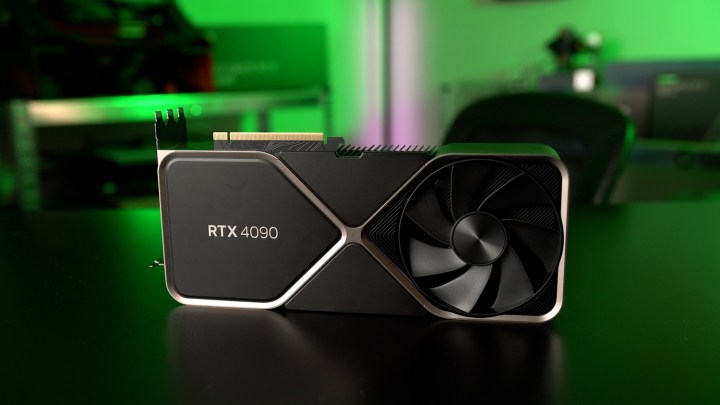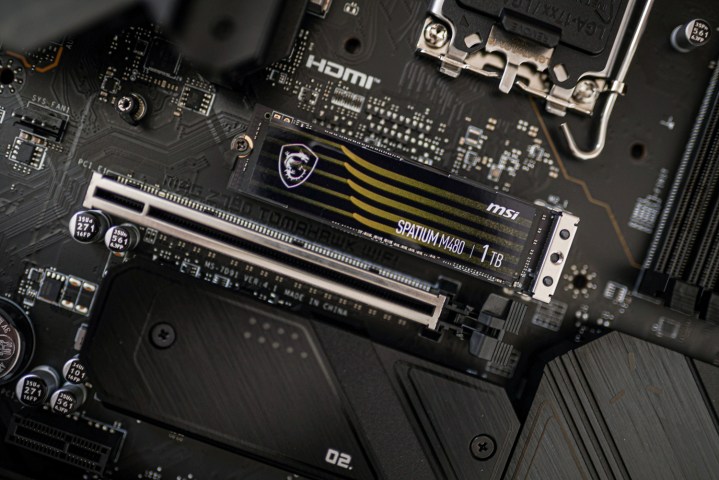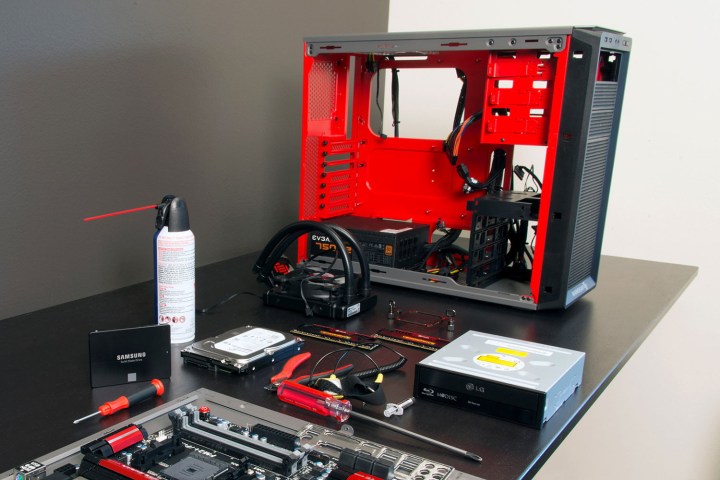If you’re no longer happy with the way your computer performs, it might be time to give your entire PC build a new look. Is it time to upgrade, or should you just buy a whole new PC? The choice can be tricky, but there are some general guidelines to follow.
A lot of things come into play, be it your budget, the performance of your current PC, or how much you can upgrade before it stops making sense. Here’s how you can make the right decision for your needs.
Start with a look at your current rig

There are no hard rules when it comes to deciding between building a new PC and upgrading your existing rig. After all, no one is stopping you from buying a whole new computer every couple of years, just as there aren’t any huge reasons not to carry out parts upgrades. That’s the beauty of desktop computers compared to laptops, and that’s also why I prefer them — they’re modular, so you can choose your own path and do what suits you best.
But there are times when you’re better off just paying for a cheap upgrade instead of throwing out a perfectly decent PC, and vice versa — times when upgrading is so expensive that it no longer makes any sense.
The way to tell those two apart is to take a good look at your existing computer and get a good idea of its current state. After all, as fun as it is to buy new hardware, you don’t want to just assume that’s the problem — at least not if you’re trying to save money.
Start by ruling out any software-related glitches and issues.
If you’ve established that you’re not happy with your performance — for whatever reason — your first step should be some troubleshooting. That alone should give you the answer as to whether bigger upgrades are necessary or if swapping out a component or two might be all that’s needed to get a solid PC again.
If you’re not sure where to start, a good idea is to rule out any software-related glitches and issues, as that won’t be resolved even if you swap out some components. Download a good antivirus program, as well as an anti-malware program (such as Malwarebytes) and run a scan. Update all your drivers and make sure that you have the latest version of the BIOS (here’s a handy guide on how to update it). Keep your Windows up to date, too, even though fresh updates can wreak some havoc sometimes. Lastly, if the performance issues only started after installing a certain new program or patch, using System Restore to go back in time and get rid of it might be a good idea.
Once software issues are out of the way, the question is which of your components are underperforming. This is why troubleshooting and benchmarking are both good first steps. For instance, frame rate drops in games can come down to the power supply, graphics card, cooling, and more — you won’t know the culprit until you dig a little deeper.
We have a guide on benchmarking your GPU, which can be a good indicator of whether replacements are due. If your GPU runs too hot or performs poorly in games, it might be time to replace it, but that can often bring on more upgrades than needed (more on that later). For other components, downloading HWiNFO or any other monitoring software is a fast and simple way to check temperatures, issues with storage or memory, and more.
All the data from these tests will tell you exactly where the bottleneck in your system is and what component might need replacing.
Add up the costs

It often makes sense to update your PC one step at a time if you’d rather not spend the full amount upfront. Over time, this cost might add up to more, especially if you end up replacing your upgraded PC with a new desktop, but any given one-time purchase is significantly cheaper. The downside? The performance gains from any part you buy won’t be as impressive as getting rid of a five-year-old PC and buying a new rig.
First, you’ll need to add up the costs of the parts you need to replace — followed by a thorough look at what’s currently available and what’s coming. Start by deciding what really needs to be upgraded, as well as whether you’ll need to buy anything extra to accommodate those components. For instance, if you’re buying a new processor, a motherboard change is likely in order — and that might mean a whole slew of other upgrades you didn’t account for. Add up those necessary costs. If the cost of your upgrades is around half (or more) of what a new PC would cost, it’s usually better to just build a new computer from scratch.
Necessity isn’t the only reason why you might be prompted to upgrade, as the marketing efforts of various manufacturers, be it Intel, Nvidia, or AMD, also play into it. Whenever a new generation of PC hardware comes out, the constant buzz around it can give the best of us a bad case of FOMO, also known as fear of missing out, and that’s just a hop and a skip away from spending money.
Whether to upgrade, buy a new PC, or sit this one out is trickier to decide if your wish only comes down to wanting to try new things. Some upgrades, necessary or not, will force you to buy more than one component, and at a certain point, it’ll make more sense to build a new PC. I’m mostly referring to the big-ticket stuff; for instance, buying a new graphics card will often force you to also upgrade your PSU, but may also require a new case or motherboard.

Be mindful not to fall into a spiral of upgrades, though. Let’s say you’re experiencing slow loading times — buying a new SSD could help tremendously there, but if that doesn’t cut it, it’s not always the best idea to keep on buying new parts until something sticks. Certain upgrades, such as the motherboard or the processor, may require so many changes that you’d be better off just buying a new PC.
If you’re on the fence about upgrading and aren’t sure whether it’s worth the money, your best bet is to look at reviews from trusted sources that compare your existing component(s) to the things you’re hoping to buy. Comparisons, such as this article where we match up Intel’s Core i9-13900K to the Core i9-14900K, can help you decide and will also show you the real-world gains you’ll get from your purchase.
At some point, if there’s too much that you’d need to upgrade, you’re better off just biting the bullet and buying a whole new PC. In my own case, my old PC received quite a few upgrades over the years, but none significant enough for it to really stay up to date. When I finally decided to build a new computer, I had an old GTX 1060, an 8th-gen Intel CPU, an old air cooling system, and a small, unimpressive case with barely any extra fans.
Seeing as I had to buy a new motherboard, GPU, CPU, PSU, and case, it didn’t matter that I had just recently got a new PSU, SSD, and RAM, as the key components in my PC were really old. If you’re in the same boat, it’s often better to give your older parts a rest and just build a new PC where everything fits well together, has a warranty, and performs on a similar level.
Some reasons it’s better to start from scratch

Beyond just price alone, there are a few other important reasons why you might want to build a new PC instead of taking the upgrade path.
Once your PC gets old enough, you’ll start running into problems with compatibility. Windows 11, for example, has some pretty steep requirements in order to run well, and every previous version of Windows also eventually forces you to upgrade your hardware through a lack of support from Microsoft. For gamers, it’s often that your PC slowly makes it impossible for you to play AAA titles at decent settings. If upgrading your PC would cost you half the cost of a new one or more to fix these issues, buying becomes a more viable solution.
If your upgrade path is limited, it makes no sense to keep pumping money into a PC that won’t give you any tangible difference in performance. For instance, if you’re already using Intel’s LGA1700 socket in your computer and have a Core i7-13600K, there’s basically no reason to upgrade to a Core i7-14600K. Sure, it’s faster and it fits the same socket, but you’re spending money on an upgrade that makes no difference.
Switching to a whole new build also gives you the benefits of future-proofing.
This is even more crucial when you’re on an older platform. Let’s imagine that you have a Core i5-8400 processor with the LGA1151 socket. The best upgrade available to you on that platform would be the Core i9-9900K. Components this old are rarely ever in stock anymore, and when they are, they’re massively overpriced. Not only would you be paying lots of money — your PC also wouldn’t get as big a boost as if you bought a chip from the latest couple of generations.
Looping back to compatibility, building a new PC may often unlock access to tech that your old PC just wouldn’t be able to handle. This, again, brings us to the platform your PC is built around. If you’ve got that old Coffee Lake CPU mentioned previously, you won’t have access to PCIe 4.0, let alone PCIe 5.0, and that means passing on some serious SSD speeds. While newer drives work with older versions of PCIe, their read and write speeds are cut down to match the older generation.
Switching to a whole new build also gives you the benefits of future-proofing, longevity, and warranty. While your old PC has probably been opened up and upgraded a couple of times by now, a new build will be just that — brand new. This means all the components will be covered by a warranty for up to five years, and you’ll be all set for a long time to come. Meanwhile, an older PC will only get you so far, and unless you swap out every component, you’ll eventually start seeing signs of aging in your existing PC.
Find a middle ground

If you follow the logic above, you should know whether it’s wiser to upgrade your current PC or build a new one. But moving forward, you might be wondering if it’s better to continue upgrading every year or two or swapping out the whole PC every five to seven years. Of course, it depends on your needs and your budget, but generally, it’s best to find a middle ground.
Sometimes, a small upgrade can make a tangible difference. Buying an NVMe SSD instead of a SATA SSD, for example, is cheap and helps a bunch. Adding extra RAM to your PC is pretty much a necessity if you’re a gamer, as AAA titles are slowly slipping into the 32GB RAM territory. We even have a guide to help you choose whether it’s time to add more memory to your system or not.
If you’re angling for more impressive upgrades, the GPU often has the biggest impact on gaming performance in many titles, but that’s only true if your CPU isn’t old enough to become a bottleneck. It’s always a balancing act. Even if you add an RTX 4080 to a CPU that’s several years old, you won’t get the same kind of performance that you’d be getting on an all-new processor. On the other hand, high-end GPUs may fare better with older processors than entry-level models because, at higher resolutions, they do more of the work in gaming scenarios.
Ultimately, it comes down to what works best for you. There’s no reason to hold out on smaller, impactful upgrades just because you’ll want to build a new computer down the line, but there’s also no reason to throw out a perfectly good PC just because it can’t support the latest and the greatest in PC hardware.



